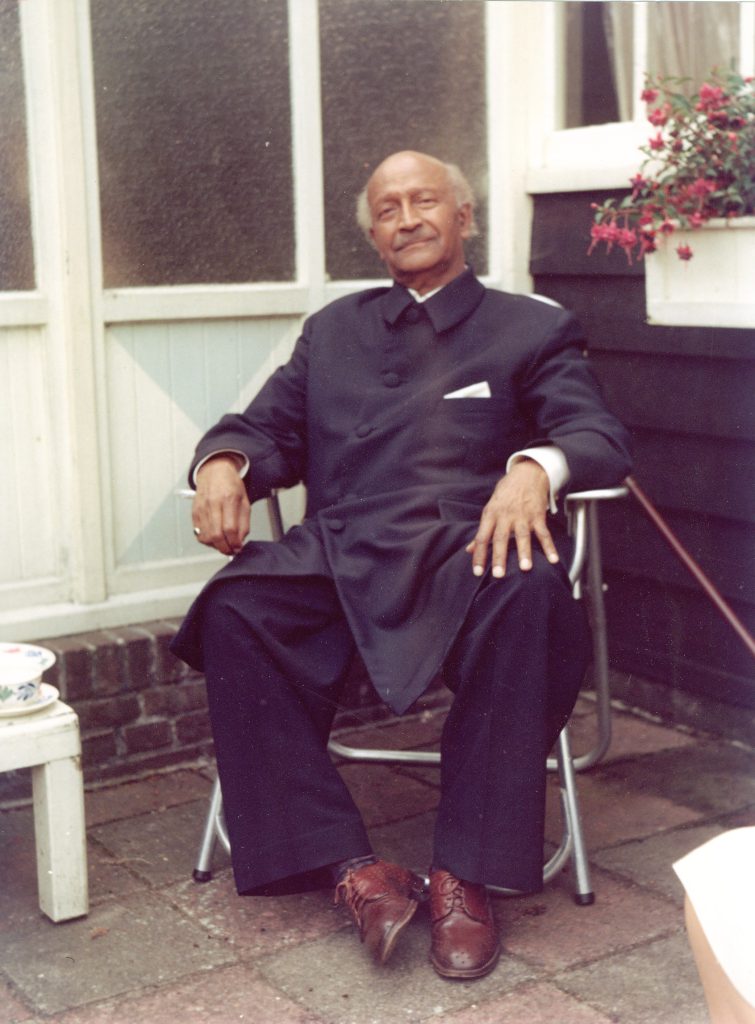Musharaff Moulamia khan was born at Maulabakhsh Haveli, Baroda State, India, on September 6, 1895 and died in Holland, at The Hague, on November 30, 1967.
He was the youngest, second surviving parental brother of Hazrat Inayat and Mir Maheboob khans, and one but youngest cousin- brother of Jagirdar Mohd. Ali khan. When the elder three, now “the 1910 Sufi Triumvirate” left for their intended, two or three years’ “grand tour of the West”, Moulamia was considered too young to join them. However, in Baroda he largely missed out on much of what the elder brothers had received in their time. The family patriarch, their maternal Grandfather Sholey khan Maula Bakhsh had died in 1896 and their Father, the long-time widower Mashaik Rahmatullah khan, by then really was too old to supervise and teach him so meticulously as he had the elder brothers. Nonetheless, quite young, music and religion became his great loves. As a young teenager he joined Inayat khan, who 1909-1910 lived at Calcutta, then still the imperial capital of British India, continuing there for a while after Inayat’s departure, before returning to Baroda.
 One and a half year later already, Hazrat Inayat khan called him, and he arrived at New York in February, 1912. Shy at first, Musharaff grew into becoming cordially outgoing. Still, he remained shocked by the unaccustomed Western variants of crudeness and plain speaking in everyday life. Under Maheboob and Ali khans’ influence, he too developed a fine tenor voice, particularly excellent in Indian music, rather than for the European music that had too a large extent been studied by the elder Brothers as well. Early recordings of his renderings remain precious testimonies.
One and a half year later already, Hazrat Inayat khan called him, and he arrived at New York in February, 1912. Shy at first, Musharaff grew into becoming cordially outgoing. Still, he remained shocked by the unaccustomed Western variants of crudeness and plain speaking in everyday life. Under Maheboob and Ali khans’ influence, he too developed a fine tenor voice, particularly excellent in Indian music, rather than for the European music that had too a large extent been studied by the elder Brothers as well. Early recordings of his renderings remain precious testimonies.
Musharaff khan was thrice married. The Dutch-Huguenote, Savitri- Subhanbi van Rossum du Chattel, who gave him many very happy years, mainly spent at their Maghreb-style house at Rueil, ‘Villa Inayat’, in the rue de l’avenir given by him when invited by the municipality to provide one, close to Suresnes, with winters in Algeria. During the famed three-monthly Sufi Summer Schools at Suresnes, the couple often gave prized and praised parties for attendees.
There too Musharaff the lively raconteur’s verbal memories were taken down by the editor of the Sufi Quarterly, Margaret Skinner. These “Pages in the Life of a Sufi”, remain of notable documentary value above all for the Brothers’ early life in India. In a recent German translation “ Der Zauber Indiens” the mistakes of names and attributions, have at long last been corrected by Mrs.Karima Sen Gupta. Thus duly revised, Musharaff’s documentary bequest takes a valued place alongside Inayat khan’s Sufi works and Maheboob khan’s song compositions. His ‘Pages’ remain of essential reading for readers of the basic source work “Biography of Pir-o-Murshid Hazrat Inayat khan”, East-West 1979, second ed. Panta Rhei, 2020. As Savitri became aged and unwell, she encouraged Musharaff khan to marry an additional wife, being the South African Dutchwoman, Zebunnisa Joyce Hiddingh. However, in the mid- forties, both wives died at Baroda and Jaipore respectively.
Having returned to his Brothers in Holland, in time Musharaff khan married the Sufi member Shahzadi W. de Koningh, who became his able support when he, at virtual retirement age, was called upon to succeed Pir-o-Murshid Ali khan as fourth leader (1958-‘67) of the Sufi Movement.
An old-age charge Musharaff khan fulfilled with great commitment and a distinctive style at once all his own and still in quite natural continuation of his three Triumvirate Brothers.
